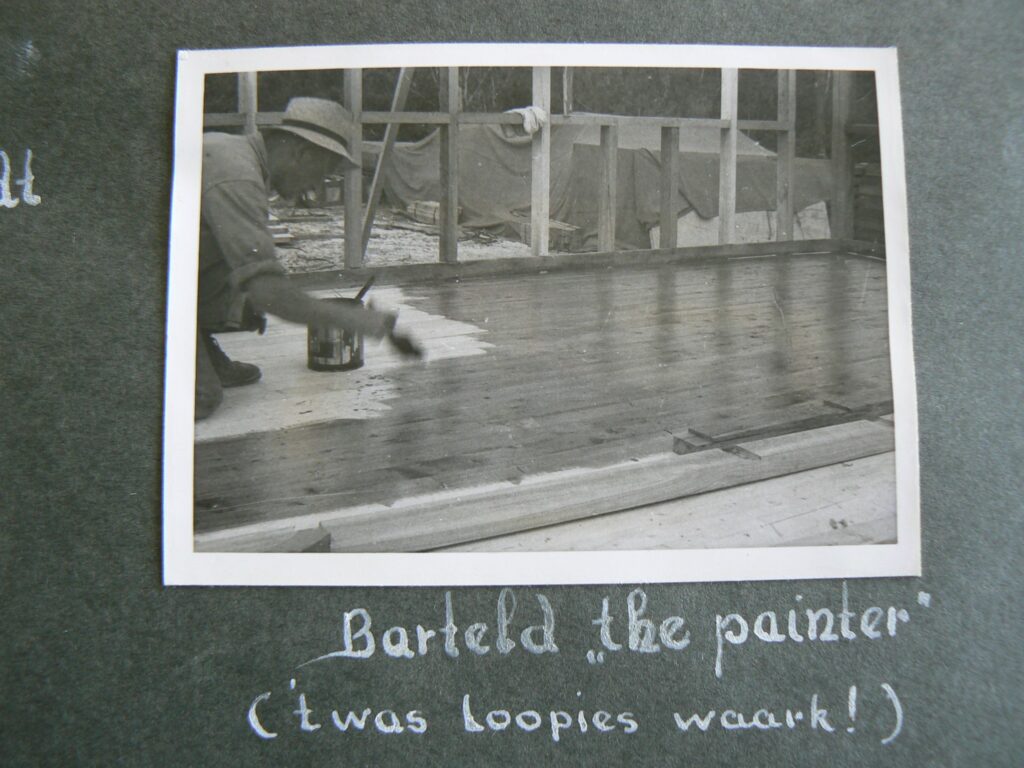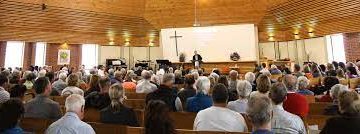Bart Jan Folkerts
18 September 1911 to 24 October 1999
An Association [Christian Parent-Controlled Schools] Founder and Gold Member
“Now with the Lord he loved and served … a man of strength,
courage and determination, a fighter for what he believed in.”
“My Grace is sufficient for you, for my power is
made perfect in your weakness” 2 Corinthians 12:9
REFLECTIONS ON HIS LIFE
Thank you for coming to share this special occasion – sad, yet joyful too, as we remember the life of Bart Folkerts – my Dad – or I should say – our Dad and Opa, as I speak on behalf of the family.
How can you possibly sum up the life of a man who has lived as full and as varied a life as Dad?
I am reminded of the Biblical expression “he died old and full of years.” But Dad was not just full of years, he was also full of life – right up to the end.
We are thankful for the rich and full 88 years he had.
We are thankful that the end, when it came, came swiftly and with surprisingly little suffering. Just a few weeks ago he was driving, playing golf, going to church, doing his rounds of visits, in seemingly good health – and now he is gone.
We are thankful that he is now with the Lord he loved and served.
One thing I can say about Dad is that he was a man of strength, someone with courage and determination, a fighter for what he believed in. Right to the end you only had to meet him and shake his hand to realise that here was a strong man, well in control of his faculties.
Having grown up in the early years of this century, he started out in business on his own, married Douwien and had two children when the Second World War broke out. He was called up, and then joined the Underground when Holland was invaded. He loved to tell the stories of the incidents (two stand out) when he was accosted by German soldiers but was able to bluff them so that they let him pass without checking his I.D. If they had, it would have meant automatic arrest and death, as the Germans were on the lookout for him. Dad was convinced that the Lord gave him the right words to say on those occasions. He remained active in the Resistance movement throughout the War. Afterwards he carried the legacy of painful memories, as well as some hearing loss and nagging headaches.
After the War he set out for a new life together with his growing family and a group of friends, arriving in Tasmania in 1950 as one of the first of the Dutch migrants, and together they set up a building company based at ‘Little Groningen’ (what is now Firthside).
Dad faced the storms of life – the ups and downs of business as well as in the family. Not long after arriving in Tasmania he suffered the tragic loss of his eldest son in a road accident. That hit him very hard. Then in 1966 he lost his wife – mum – at the young age of 57 (well it certainly seems young to me now!).
So he has been on his own for over 30 years, but maintained good health until the last 6 weeks.
Dad was not only a painter by trade, he was also a good artist, as anyone can verify who has been inside his house and seen the lovely mural of “The Poorters huisje”. He also painted individual murals in the bedrooms of each of our children in a previous home and we were sad to have to leave these behind.
Dad was prepared to fight for what he believed in; he strongly believed in hard work and fair play, and was prepared to speak out when he saw injustice or prejudice.
He grew up in an era where you didn’t necessarily talk a lot about the inner things of personal thoughts and feelings – rather he let his actions speak for him.
2. He was also a great story-teller and a charming companion, and had many a tale to tell of his war-time experiences and his family in Holland.
He was wonderful company, whether it was Tuesday morning coffee with the daughters, a vist from the great grandchildren, a game of klaverjassen with the oldies, or a cup of coffee with one of his friends.
He was a man of passion with a real sparkle and sense of fun, which he kept right to the end.
Even in the last days in hospital the nurses would come and explain that they needed to do some medical procedure such as give him a needle, and he would ask “Is het gevaarlyk?” (“Is it dangerous?”)
Several times the nurses commented on his cheeky smile, even on the day before he died.
Son-in-law Fred came in the Friday before he died and wondered what Dad thought of people taking flowers out of his own garden in order to bring them to him in hospital. Dad just smiled and went (thumbs up gesture).
He always seemed to have an apt comment for every situation, and he wasn’t past the odd practical joke – in fact, he quite enjoyed playing tricks on people. He used to give our girls monetary presents for their birthday – but even in this he was capable of surprises. One birthday Cathy received what looked like a roll of lollies – when she opened it up she found a roll of $2 coins instead.
Dad loved his games – whether it be a game of klaverjassen or triominoes with some of his older friends, a game of 8-ball with Fred or a game of golf with his mates. As with everything about Dad, he played wholeheartedly and with intensity. He taught me to play chess as a boy, but the funny thing was, when I started winning we didn’t play anymore. He was always prepared, and in the boot of his car he carried – not just a set of golf clubs but also a bag with several of his favourite board games.
3. Dad was a generous giver; he was a man with a big heart. He let his actions express his love for his family and people generally. He reached out and served those in need in many practical ways.
As a host he was always generous, and had a knack of relating to (and spoiling a little bit) even the smallest child. For this reason the great-grandchildren just loved ‘Opa Folkerts’. On one occasion Simon and Veronica’s young David, when Opa Folkerts name was mentioned, said “He’s my special friend.” And when Sonia said she was off to visit Opa Folkerts in hospital, little grand-son Connor said “marbles!” (referring to the special toy Opa brought out for the little ones).
He was just amazing in his attentiveness to birthdays and other special occasions, and not surprisingly he was well-loved by young and old alike.
4. In all I’ve said so far I need to bring a balance.
Dad wouldn’t want a eulogy that just sung his praises. In fact he would find that abhorrent.
Rather he would want an address that pointed to his faithful Saviour – Jesus Christ.
For all his good points – and I can confidently say that Dad was a good man – Dad was very conscious that he was a frail and sinful man. He knew that apart from the grace of God he could do nothing of lasting value; without God’s grace he would not be able to stand before his Maker when his time came.
I remember one time when Dad was commenting on a sermon – not one of Brian’s [Vaatstra] of course – and he said quite emphatically (as he was capable of doing) – “It was good, but there was one thing missing – there was no mention in it of the grace of God.”
Dad knew, when all was said and done, that he was a sinner in need of God’s grace.
While he always had a strong faith he became more open about this in recent times. He was very privileged just in the last year or two to have God wake him in the night and give him some special Scriptures. He loved to read these and tell us how he had received them. I guess this demonstrated to Dad in a very real way that God loved and accepted him.
In the end he continued to show his love to those around him. He could do little – he was very frail and dependent – yet he loved and appreciated the loving care of his family, and that of the staff and his friends.
(On behalf of the family I would like to express our sincere appreciation to Brian for all his support to Dad and us over these last weeks)
In all this we can thank God for the life and witness of our Dad and Opa.

foto courtesy Pieter Laning estate.
In November 1945 the Stichting (Foundation) 1940-1945 in Groningen asked the Resistance workers to give an account of their work during the occupation. Each person’s account was vetted by two colleagues. The record was lodged in the Verzets Museum.
The record was made, in part, so that family and friends could read, in peace, what their father (usually) or family member had achieved, and what they had endured in the war years. The translation was made so that Australian born descendants could also read the record.


